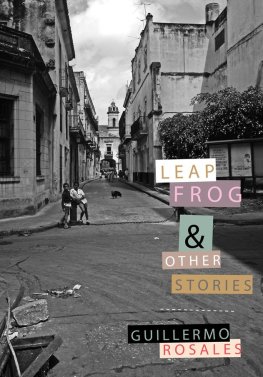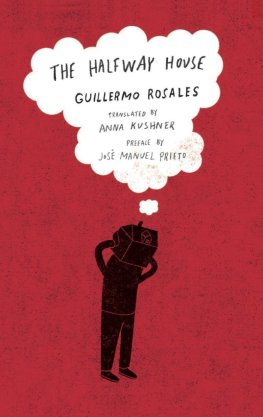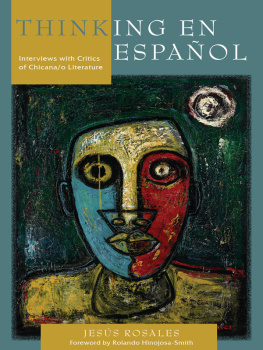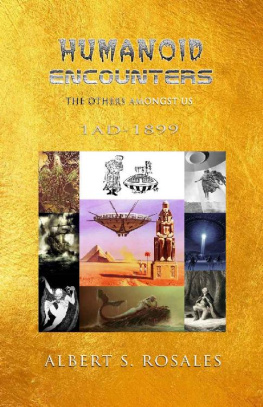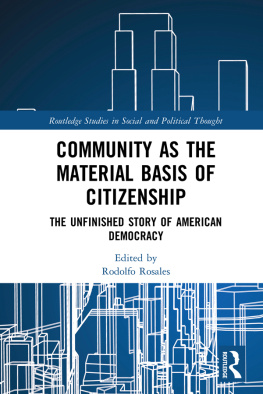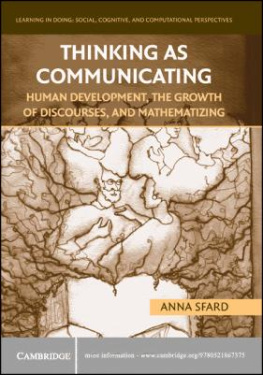Rosales - Mathematizing
Here you can read online Rosales - Mathematizing full text of the book (entire story) in english for free. Download pdf and epub, get meaning, cover and reviews about this ebook. City: New York;United States, year: 2015, publisher: Redleaf Press, genre: Children. Description of the work, (preface) as well as reviews are available. Best literature library LitArk.com created for fans of good reading and offers a wide selection of genres:
Romance novel
Science fiction
Adventure
Detective
Science
History
Home and family
Prose
Art
Politics
Computer
Non-fiction
Religion
Business
Children
Humor
Choose a favorite category and find really read worthwhile books. Enjoy immersion in the world of imagination, feel the emotions of the characters or learn something new for yourself, make an fascinating discovery.

Mathematizing: summary, description and annotation
We offer to read an annotation, description, summary or preface (depends on what the author of the book "Mathematizing" wrote himself). If you haven't found the necessary information about the book — write in the comments, we will try to find it.
Mathematizing — read online for free the complete book (whole text) full work
Below is the text of the book, divided by pages. System saving the place of the last page read, allows you to conveniently read the book "Mathematizing" online for free, without having to search again every time where you left off. Put a bookmark, and you can go to the page where you finished reading at any time.
Font size:
Interval:
Bookmark:

Published by Redleaf Press
10 Yorkton Court
St. Paul, MN 55117
www.redleafpress.org
2015 by Allen C. Rosales
All rights reserved. Unless otherwise noted on a specific page, no portion of this publication may be reproduced or transmitted in any form or by any means, electronic or mechanical, including photocopying, recording, or capturing on any information storage and retrieval system, without permission in writing from the publisher, except by a reviewer, who may quote brief passages in a critical article or review to be printed in a magazine or newspaper, or electronically transmitted on radio, television, or the Internet.
First edition 2015
Cover design by Percolator
Cover illustration by Allen David Rosales
Interior design by Percolator
Typeset in ITC Stone Informal
Interior photos by Allen C. Rosales
Library of Congress Cataloging-in-Publication Data
Rosales, Allen C.
Mathematizing : an emergent math curriculum approach for young children / Allen C. Rosales. First edition.
pages cm
Includes bibliographical references and index.
ISBN 978-1-60554-396-3 (ebook)
1. MathematicsStudy and teaching (Elementary) I. Title.
QA135.6.R65 2015
372.7'043dc23
2015006439
To my family, for their love and support that has made me a better educator, husband, and father.
To the teachers in our field who are the childrens champions. Your love and perseverance for the work with children is inspirational.
To my Creator, for providing such a masterfully designed and mathematically patterned creation. Thank you.
CONTENTS
I would like to express my sincere gratitude to the many early childhood schools and educators that have been a part of my personal and professional life and who supported me throughout the writing of this book. The collaboration and friendship that you demonstrated were fundamental to my work, and your dedication to the children and families you serve is inspirational. The following schools opened their hearts and resources to me and played an important part in my ability to apply the Mathematizing for Learning Process approach in their settings. They include: Belmont-Cragin Early Childhood Center, Albany Park Community Center, Chinese American Service League, Erie Neighborhood House, Josiah L. Pickard Elementary School, Carole Robertson Center for Learning, Family Home Daycare, and Laurance Armour Day School.
A special thanks to Reggio Emilia approach practitioners in Italy and the United States for their ability to create spectacular learning environments for children and for sharing their perspectives with the field. I became a Reggio Emilia-inspired practioner in the mid 90s after watching To Make a Portrait of a Lion and have followed their work ever since. Thank you for your commitment to the field.
I am also grateful to Erikson Institutes Early Math Collaborative team for their excellent work with early childhood schools in Chicago and for allowing me to participate in the collaborative as a coach and consultant. The math professional development, research, and dissemination practices I experienced in the collaborative strengthened my math practices and inspired me to share those perspectives with the field.
A special thanks to my editors Todd R. Berger, David Heath, Douglas Schmitz, and everyone at Redleaf Press for their patience, collaboration, and professionalism.
Lastly, I give a heartwarming thank-you to all of the teachers, children, and families that allowed me to observe and document their learning practices and processes. I hope my documentation work in this book captured the essence of the mathematizing interactions you experienced at your schools.
My earliest recollection of mathematizingalthough I didnt realize what was happening at the timeoccurred at a grocery store when I was five. My mother engaged me in a fun learning experience while shopping for fruit. I wonder how many bananas we will need for the week? she asked me. Should we buy the big cantaloupe or the small one? Which fruit do you think is heavier, the cantaloupe or the orange? Why do you think the cantaloupe is heavier? Using words like how many, big, small, and heavier as we shopped was my mothers way of introducing mathematizing into my young life. The continual math play we engaged in helped me develop the ability to see and think about math (mathematize) as part of my everyday experiences.
According to Merriam-Websters Collegiate Dictionary, 11th edition, to mathematize is to reduce to mathematical form. In their National Council for the Teaching of Mathematics News Bulletin article, Jacqueline Leonard and Nora Ramirez define mathematizing as the ability to identify the relationships and quantities that exist in specific contexts (Leonard and Ramirez 2009, 1). As an early childhood educator, I define mathematizing as the process of understanding math within the contexts of childrens daily lives. The intention with my definition of mathematizing is to direct attention to the words process, understanding, and context, which are key elements of respectful early childhood curriculum practices. This process can be cognitive or linguistic or both.
The grocery store shopping experience I had with my mother is a good example of how a common situation can be reduced to pure mathematical form, in order to teach critical math concepts within a childs be seen as environments, both physical and intellectual, that are created to bring mathematics alive for children. Teachers who establish micro-math cultures in their classrooms mathematize daily routines, activities, play, explorations, and investigations that children encounter through relationships with their friends, families, and environments.
Within any chosen task or activity, mathematizing teachers can help children make sense of the math concepts they are learning. Take for example infant and toddler children who love to fill and dump water into cups, bowls, and other containers at the water table. A teacher with a mathematizing eye observes and identifies the mathematics that the children are investigating, in this instance the concept of conservation and its accompanying variables (volume, capacity, adding, subtracting). Adults can promote ) to help children develop language and conversation skills. A teachers math language at the water table could include statements such as these:
You are pouring the water into the cup!
You are squeezing the sponge and filling the cup!
The cup is full!
You are dumping the water from your cup!
Your cup is empty now. The water is all gone!
At the preschool level, the same mathematical conversations could continue, with the opportunity of including more advanced math vocabulary and to the exchanges. This will help children develop and make meaning of the math concepts they are investigating. Preschool teachers can use language such as the following:
Your cup is half full!
The water is reaching the top of your cup!
I wonder how many cups of water it will take to fill the tall container?
Why do you think it took the same number of cups to fill the tall container and the short, wide container?
Next pageFont size:
Interval:
Bookmark:
Similar books «Mathematizing»
Look at similar books to Mathematizing. We have selected literature similar in name and meaning in the hope of providing readers with more options to find new, interesting, not yet read works.
Discussion, reviews of the book Mathematizing and just readers' own opinions. Leave your comments, write what you think about the work, its meaning or the main characters. Specify what exactly you liked and what you didn't like, and why you think so.

